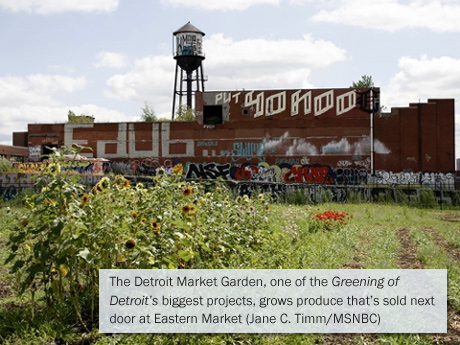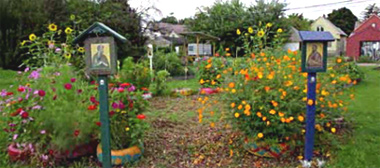Wanted to a share a rare “good news” story out of Detroit for a change (reported by none other than MSNBC): Urban farming takes hold in blighted Motor City ~

In a city with too much abandoned, derelict, and ruined space, Detroiters are fighting back with one of the country’s largest urban agriculture movements. Residents, nonprofits, and corporations are rehabilitating their city in a sustainable–and often edible–way […]
“We estimate that there are between 1500 and 2000 gardens in the city of Detroit,” (Rebecca Salimen Witt, who runs nonprofit garden “Greening of Detroit”) said. “Some of them are little postage stamp gardens in someone’s backyard, and some of them are full scale urban farms that are growing produce for sale, serving as someone’s primary living.”

It makes perfect sense. There are currently an estimated 30,000 acres of vacant land within the city limits. And gardening is really the cheapest way to make productive use of those abandoned acres – especially if there are residents volunteering to plant, tend and harvest.
Aiding in the promotion of the greening effort – and pleasantly surprising in a progressive city that rarely loosens regulations – in March, the city rewrote an old ordinance, legalizing urban agriculture.
Now, growing and selling produce in your backyard is allowed.
How refreshing!
“The biggest thing we can do is try not to get in the way–within reason, of course,” said Brad Dick, the head of the city’s maintenance and parks department. They try to support local gardeners by dropping off mulch gathered from their tree removal duties.
The greening of Detroit apparently is part of a growing  worldwide phenomenon. There’s even an Urban Gardening website where you can view gardens from around the globe.
worldwide phenomenon. There’s even an Urban Gardening website where you can view gardens from around the globe.
To the Source focused on the city garden “revolution” in their weekly article last week, featuring Ron Finley, a “guerilla gardener” in South Central L.A..
Seems Finley ran into trouble with the city for planting a “food forest” in front of his house ~
“It was on a strip of land called a parkway. It’s 150 feet by 10 feet. Thing is, it’s owned by the city. And somebody complained. The city came down on me, and basically gave me a citation saying that I had to remove my garden, and the citation was turning into a warrant. And I’m like ‘Come on, really? A warrant for planting food on a piece of land that you could care less about?'”
Finley wouldn’t back down. He would not be driven from his garden. He circulated a petition, and he kept gardening. Where there is life, even a little on a parkway strip, there is hope, and miracle of miracles, the city backed down—after issuing two more citations to other Finley-inspired guerrilla gardeners.
Wow. Even the Leftie haven of Los Angeles saw the advantages of allowing people to garden on their own property in the city.
Maybe they relented after realizing that “guerilla gardening” provides benefits beyond just pragmatic land use… mostly intangible things. Growing your own food instills a sense of pride, accomplishment, self-reliance. Urban gardening promotes a sense of community and helps reduce crime.
As Dr. Benjamin Wiker explains in the To the Source article ~
One of the first and most salutary effects of urban gardening is that it brings people out of their houses, out of isolation, and into the vacant lots and parkways to work together in the magical but wholly natural transformation of a bleak landscape into a common garden.
That should appeal to everyone. Urban gardening seeds both real community and real economic independence. Rather than people living namelessly and facelessly in an endless, sprawling concrete city, they suddenly belong to a cozy community where people actually know and trust each other because they’ve worked side by side.
As “Magnetic Sun” says (on the MSNBC video) about gardening, it “gives you a sense of independence.” And “it makes you feel good.”
That good feeling might be the best thing about urban gardening; simply the soul-refreshing sensation one gets from being close to nature. Because, after all, we were created by God to be part of His creation – not to merely subsist in concrete jungles.






Pingback: Motor City Takedown: Operation Compliance | Designs on the Truth